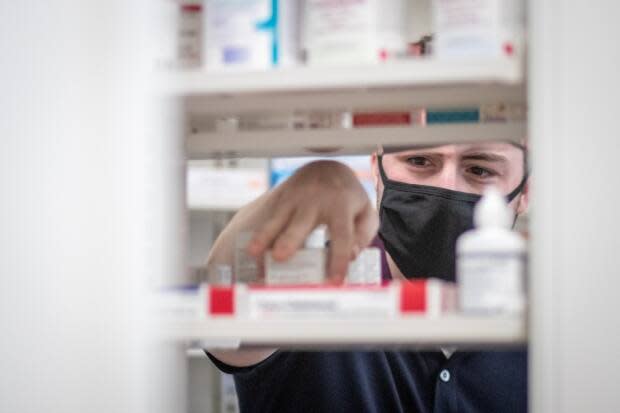N.B. businesses with high-risk clients might need to keep COVID-19 restrictions

Some businesses whose clients have health risks, like pharmacies, will have to consider which COVID restrictions will remain in place, even after New Brunswick goes green on Friday.
For some, restrictions like mask-wearing, sanitizing hands and keeping Plexiglas dividers will likely stay in place.
"As a healthcare setting, [pharmacies] need to be cautious. Decisions will be made on a store–by–store basis," said Jake Reid, the executive director of the New Brunswick Pharmacists Association.
For example, people entering a pharmacy to get a COVID-19 vaccine will most likely be asked to wear a mask, since they aren't yet fully vaccinated, said Reid.
But many pharmacies in the province have peculiar business models, because they are part retail and part healthcare settings.
According to Reid, this might mean people will be asked to wear masks if they are walking to the back counter to work in close proximity with the healthcare providers, but won't have to do so if they just go in to buy food.
"But we need to make it very clear to create a non-discriminatory atmosphere," said Reid.
Posters and clear signs at the door will identify the rules each pharmacy expects their customers to follow, he said.

Grey zones remain
Louis-Philippe Gauthier, a senior director for the Atlantic branch of the Canadian Federation of Independent Business, said every workplace will have to do an assessment to understand the risks at their stations.
"There are a few musts. For example, hand washing stations, making sure the ventilation is adequate, having somebody designated to listen to Public Health orders," he said.
Part of the risk assessment businesses will have to do involves asking employees if they are vaccinated, according to Gauthier.
"But does the employee have to answer? That's a question mark."
And it's one many business owners have called to inquire about, Gauthier said.
According to him, you can't force an employee to answer, but he said knowing if employees are vaccinated would help determine the level of risk in the workplace.

'We don't want people to die'
Reid said New Brunswick is about to enter an awkward phase that will probably last months as people try to decide what the new normal is and what risks they are willing to accept.
But he doesn't expect any issues in stores.
"I think people will understand."
What concerns him most at the moment is the vaccination rates slowing in New Brunswick, he said.
"We are not getting vaccinated because we want to reopen the economy, we are getting vaccinated because we don't want to get sick and we don't want people to die."

